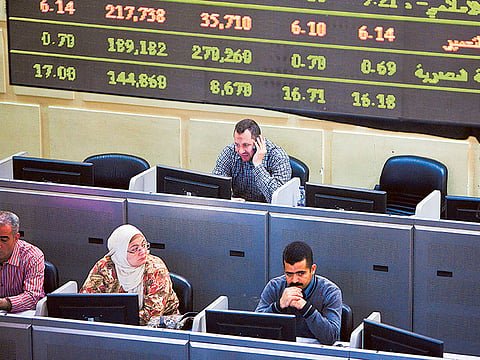Foreign holdings of Egypt debt rise as banks attract billions
Foreigners held 10.2 billion pounds ($540m) worth of T-bills in December

Cairo: Foreign holdings of Egyptian treasury bills have grown since the pound was floated three month ago, while renewed trust in the currency has sent billions of dollars into local banks.
Foreigners held 10.2 billion pounds (Dh1.9 billion, $540 million) worth of T-bills in December, state-run news agency Mena reported, citing central bank data and without specifying how much of that sum came from new inflows. That’s more than 10 times the 989 million pounds of foreign holdings reported in October, though still a fraction of the 60 billion pounds held before the 2011 uprising against then-President Hosni Mubarak.
Meanwhile, the central bank said commercial lenders were able to attract $9 billion since the float, largely from households and private businesses selling foreign currency and remittances from abroad.
“Trust in the system is growing,” Assistant Sub Governor Rami Aboul Naga told Bloomberg News late Tuesday. “We have seen a notable improvement in foreign currency inflows to banks over the past few weeks.”
The central bank said November 3 it was abandoning all currency controls in an effort to ease a dollar shortage that crippled economic activity, paving the way for Egypt to secure a $12 billion International Monetary Fund loan. The dollar traded at as much as a 100 per cent premium to the official exchange rate on the black market before the decision.
Stocks surge
Egypt has created a “well-functioning” currency market that is reflected in the pound’s exchange rate, the IMF said last month, adding that the currency may strengthen after a period of “overshooting.” The pound has weakened by more than 50 per cent since the float and was trading at 18.725 per dollar at 9:07am on Wednesday, according to data compiled by Bloomberg. Stocks have since surged by more than 40 per cent.
“The diversity of sources of inflows from remittances, individuals, investments is a major indicator of the success of the new system,” said Reham ElDesoki, senior economist at Dubai-based investment bank Arqaam Capital.
“Now there is a gradual erosion of the foreign currency backlog. Once this happens, the pound will start strengthening and the black market will completely disappear,” she said.
Sign up for the Daily Briefing
Get the latest news and updates straight to your inbox



